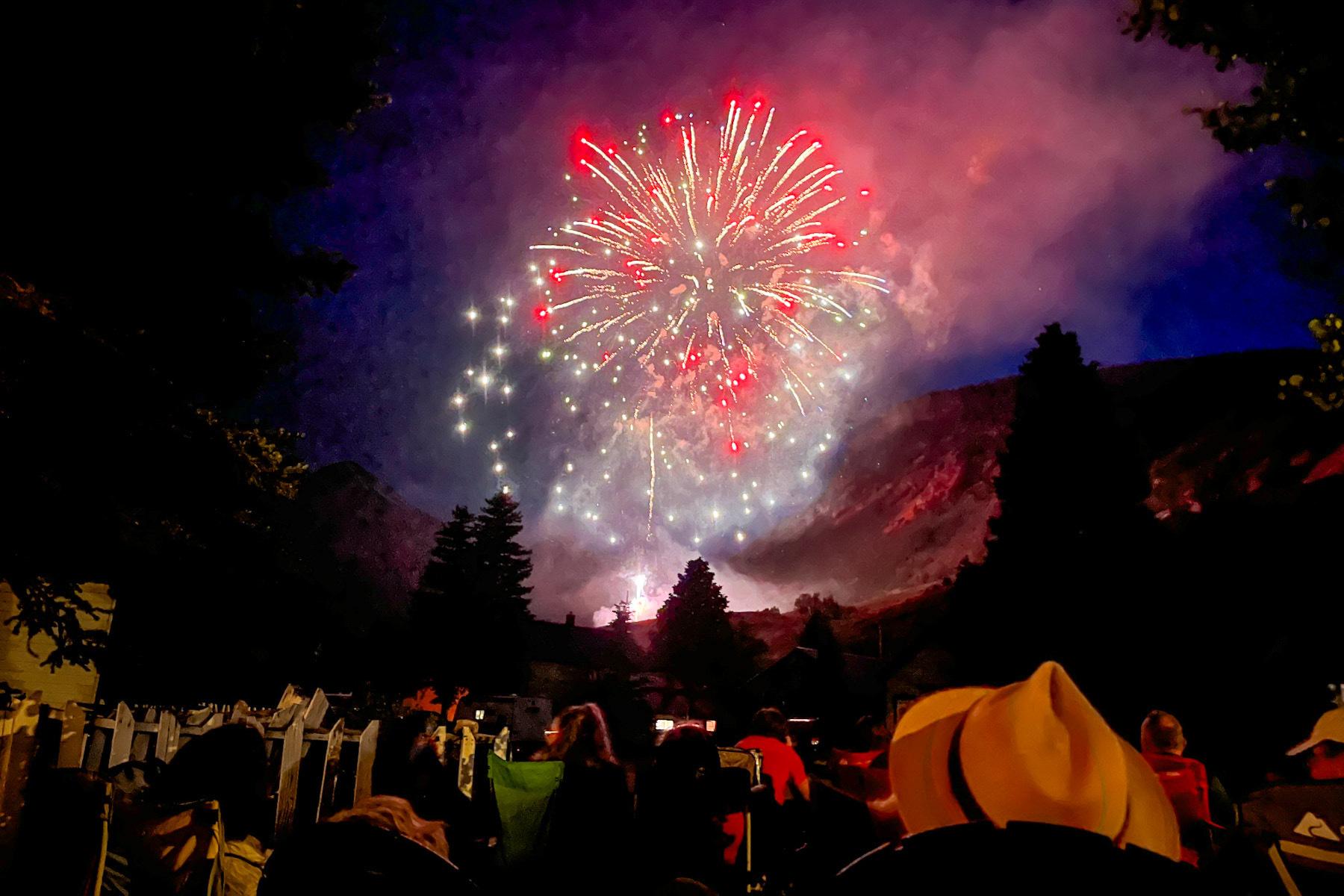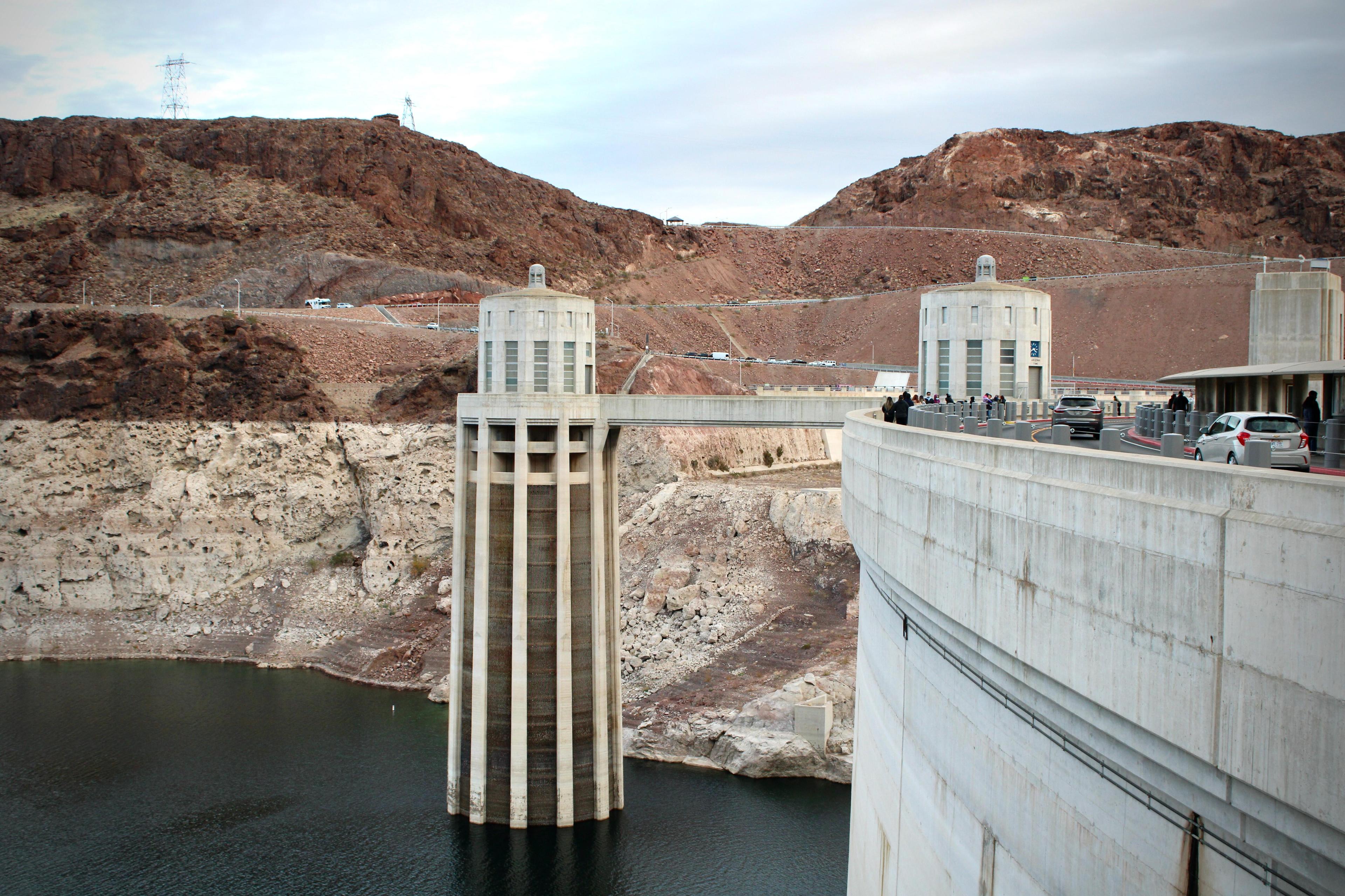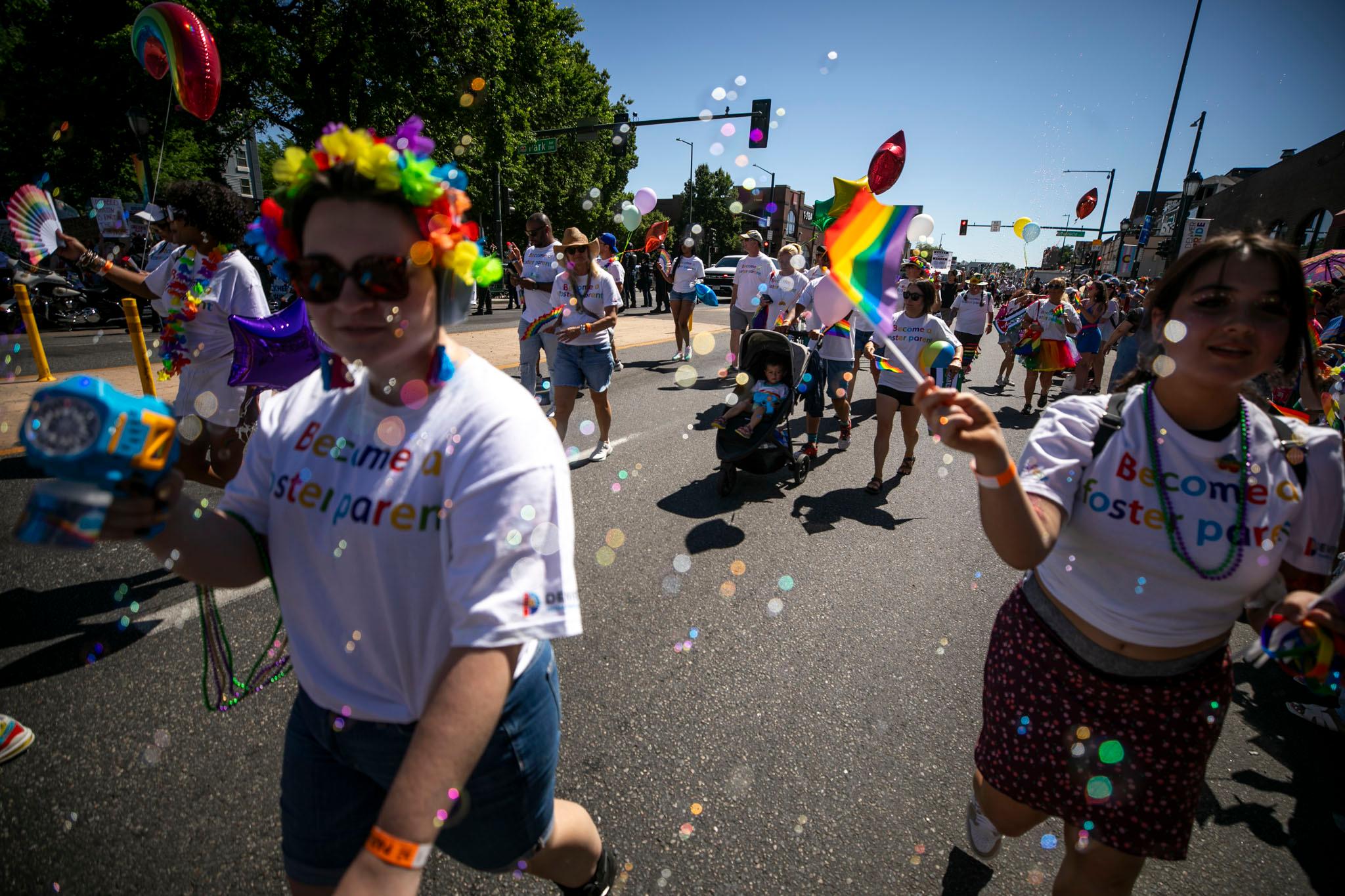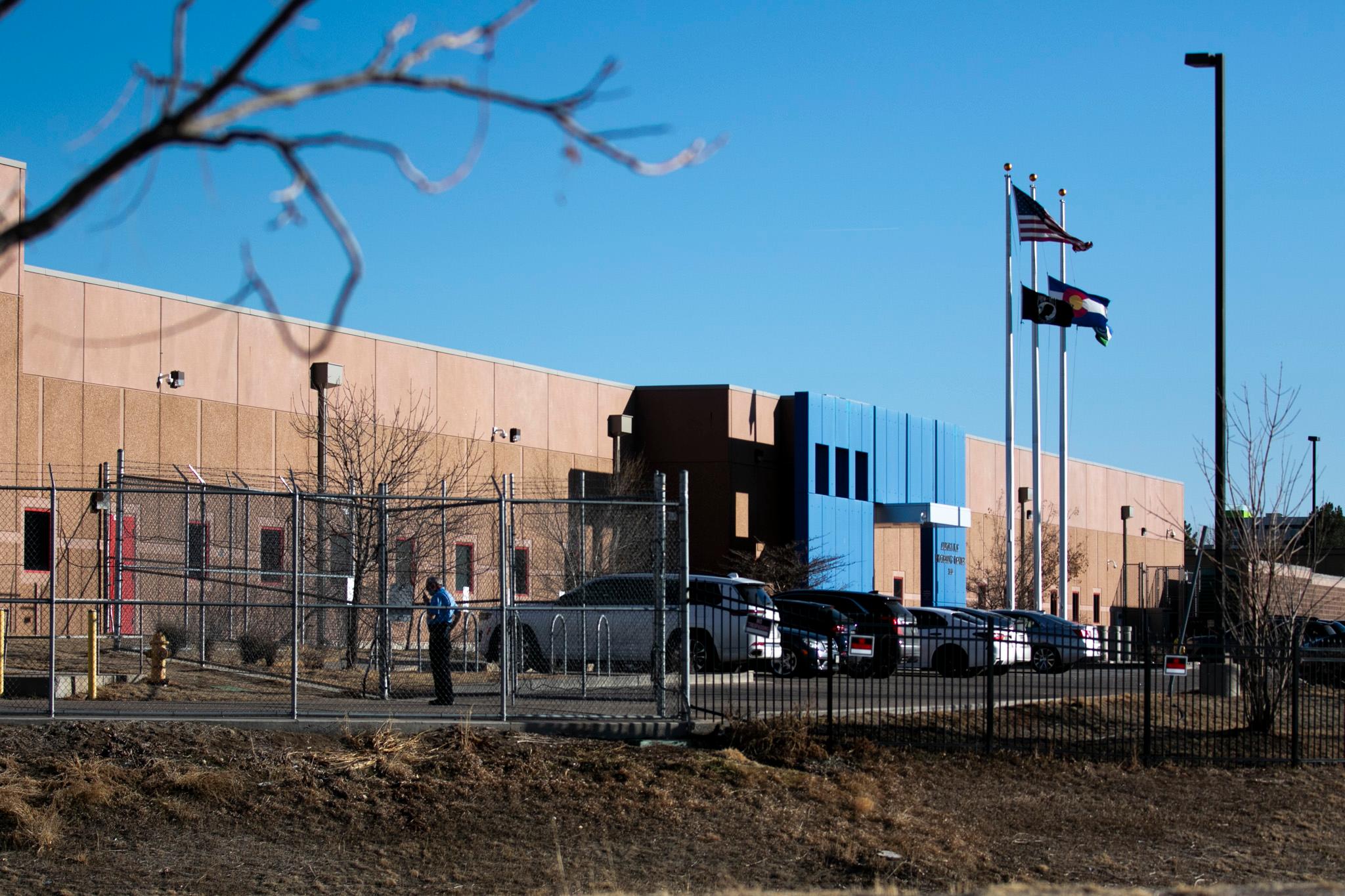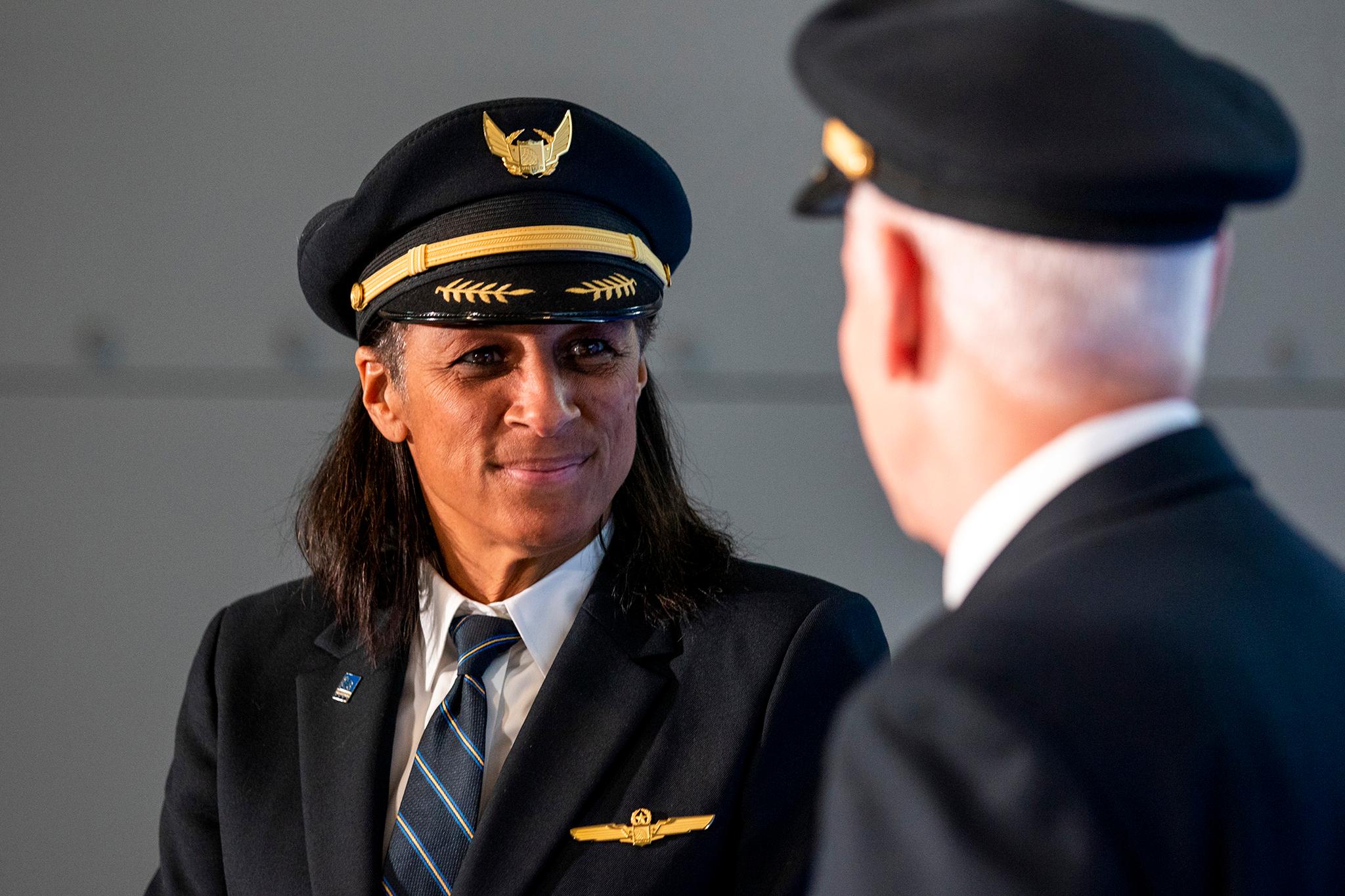
Growing up, M’Lis Ward considered any number of careers, including acting. And indeed bright lights awaited her; they just weren’t coming from Hollywood. Ward, who lives in Denver, is the first Black woman to become a captain at a U.S. passenger airline, United. And three decades later, she paves the way for future aviators, as a flight instructor.
"I'd like to leave a legacy by being a part of something that's bigger than myself,” Ward told Colorado Matters senior host Ryan Warner. “Maybe mentor someone or inspire someone to go out and do something bigger and better than I could ever have dreamed of."
That might be hard to do, because of the extraordinary life Ward has led. Even before she flew for United, Ward made history as the first Black instructor pilot in the Air Force – at a time when women weren’t allowed to fly those planes in combat. And even before that, Ward made her mark as a member of the University of Southern California women’s basketball team, a squad that featured Hall of Fame players Cheryl Miller and Cynthia Cooper.
Ward said athletics, and the idea of competing, have been essential to her accomplishments.
“When you play on a national championship team, you're not used to losing,” she said. “So it made me incredibly competitive that I was not going to fail at anything I tried in life because I liked being a champion. I like being a winner. And so that kind of always set the tone for anything I attempted in my life.”
Ward also talked about her experiences as a minority, as a Black woman in male-dominated areas like the military and flying for a commercial airline, as a member of the LGBTQ-plus community, and her concerns that previous gains made in inclusivity could be lost.
“I am alarmed at the precedents of this country to remove precedents,” Ward said. “We are re-adjudicating decisions made, important decisions made in the history of our country, and saying, we know better than what someone before us did. And I do see us moving in (an) alarmingly wrong direction.”
This transcript has been edited for length and clarity:
Ryan Warner: You were the Air Force's first Black instructor pilot. Your aviation career began after a chance encounter at the University of Southern California where you played basketball on a squad that won multiple championships. How do Athletics prepare you for a cockpit?
M’Lis Ward: The preparation for flying is not very dissimilar to the preparation for a game. So when you're preparing for a game, you learn plays, you learn the opponent and how you're going to guard them and hopefully defend them to beat them. And so the approach for me was quite the same. I prepared by studying and being ready for all the tests and there were numerous of those. And then there's this thing called chair flying where you kind of mentally picture the flight before you actually go do that. And that was very similar to what I experienced, not just in basketball, but all the sports I played in. But I will tell you what prepared me from an athletic standpoint was when you play on a national championship team, you're not used to losing. So it made me incredibly competitive that I was not going to fail at anything I tried in life because I liked being a champion. I like being a winner. And so that kind of always set the tone for anything I attempted in my life.
Warner: The chair flying makes a lot of sense to me. This idea that you run through the flights or the game or whatever the task is ahead of you in your mind, and that makes you better prepared. Do you still do that? Do you still fly in the chair?
Ward: Absolutely. Even today when I'm preparing to go either fly myself or participate in training in the simulator and I'm just really playing the role of captain or first officer for a student in training, I always study and make sure that I know exactly what controls I should be touching at what time and in what order, and the checklist that I either have to read or respond to. You never stop studying as a pilot. You never rely on, "Oh yeah, I've been there, done that. I know what I'm doing." Because the book always changes anyway. You don't just go through it in your mind; actually, your hands are moving during chair flying where you would normally be touching controls.
Warner: You spoke this month at the National Gay Pilots Association Annual Conference saying:
“I'd like to leave a legacy by being a part of something that's bigger than myself. Maybe mentor someone or inspire someone to go out and do something bigger and better than I could ever have dreamed of."
Were there messages from society as a gay Black woman or messages from your industry specifically that you had to fight not to internalize or that you did internalize and had to get rid of?
Ward: Oh, absolutely, there were pressures. I like calling myself the three-for-one minority, the first two being Black and being a woman. You can't hide that. And so people have preconceived notions about who you are. And for me, they either thought that I couldn't fly or I had achieved a certain rank or position or award because they were trying to take advantage of minority status. And so I didn't care what people thought. I knew I would always be qualified for anything I got, but when you add the gay portion to that, which is something that you have a choice to hide or not. For many years of my career, I hid that part of myself because I just thought, I don't want someone else to have another reason to believe that I don't belong here. And then I finally came out fully in my entire life in 1999, and that was when my partner, who is now my wife when she actually got pregnant with our twin girls, and I realized I work in a space that's the size of a closet and I refuse to live in one anymore. You just can't deny yourself the person you're in love with and children, you just have to be out there and everyone else be damned if they don't like it.
Warner: It's interesting you say you can't hide being a woman or being Black. I'm just speaking from personal experience. It's not all that easy sometimes to hide that you're gay. I mean, people kind of read me all the time. They certainly read me as a kid before I read myself. So it can take some effort to be in the closet.
Ward: Oh, absolutely. In fact, it's funny that you say that because if you ask folks that I went to high school with, all of my classmates, they'll tell you that they knew I was gay and I didn't know I was gay in high school. I'm like, "Why didn't you tell me? You would've saved me a lot of heartache and trouble instead of trying to figure this out all myself in college." But you're absolutely right, and obviously, there are characteristics that people will automatically attribute to you that say, "Oh, you must be gay because you're assertive and you're not afraid to speak up and you walk tall." And I'm like, "There's a lot of straight women that do that too. That's just your preconceived notions." But I never really tried to hide my personality. I just didn't fully disclose the rest of the story.
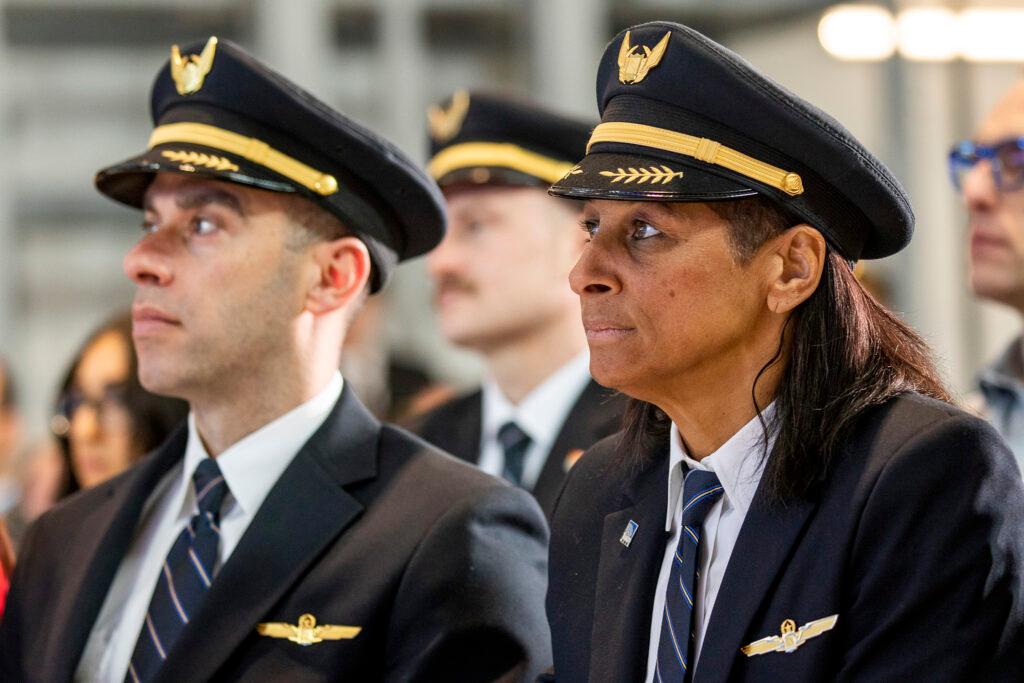
Warner: You flew fighter jets in the Air Force at breakneck speeds, but you've said cracking the sound barrier, so more than 750 miles an hour is kind of ho-hum.
Ward: Well, so first of all, I didn't fly fighter jets. The training jets, one of them, the T-38 did break the sound barrier. Unfortunately, at that time in the Air Force, and really in all of the military, women weren't allowed to fly in combat. So I never actually had the opportunity to fly a fighter jet. I just instructed our initial trainer, which was still aerobatic and I trained a lot of other guys to go fly their fighters, but I never got the opportunity. I had an offer at one point in time in about 1993 to actually go fly when women were allowed to fly in combat. I was offered a position to go fly an A-10, but eventually, I just turned it down because it just wasn't in the cards for me at that time in my life to go fly in a unit in Pennsylvania when I lived in Chicago.
Warner: So, gosh, there are a few things I'd like to follow up thereon. How is breaking the sound barrier ho-hum?
Ward: You know why? Because it's more dramatic for the people on the ground. Nothing happens in the airplane. There's no boom when you're flying it and the speed dial, the airspeed indicator, does a little bit of a flick and your instructor says, "Oh yeah, you just cracked the sound barrier." I'm like, "Oh yeah, that was exciting." I was like, "Can we go do the loop again?" I mean, that's more exciting to do the aerobatic stuff instead of going fast. I've broken (the sound barrier) twice. One was intentionally when we all had one ride where we got to do it. And then one was unintentionally. It was in a formation flight. I was the second aircraft in a two-man ship and I was complaining to my instructor, "God, I am all over the place. I can't seem to stay in the position where I should be." He's like, "That's because we're going faster than the speed of sound and we're not supposed to be. So you're actually doing a really good job for the speeds we're flying." So one was intentional, one was unintentional, and both were ho-hum. So yeah, probably a lot of noise on the ground though.
Warner: And then to this idea that you would train men, you would get them ready to fly fighters, but women were not allowed so much in those roles. What a crock of BS.
Ward: Well, there's a lot of crock of BS for women as we progress through the '80s and '90s, and bit by bit we peeled back that onion and worked for our opportunities. I didn't take it that way though. We all had a role. It's a teamwork thing. When you're in the military you don't belabor the idea that, "Oh, someone has an opportunity I don't have." You just do your job and you do it really well because, in the end, we're all in the same team trying to protect our country for the freedoms, for everyone to have. So you don't think of it that way. I didn't think of it like I was being restricted. I just looked at it, "Okay, what can I fly? Here's my list. And I chose." They were all great opportunities and in the end, flying the cargo planes that I eventually flew in the military really prepared me for the commercial career that I had. Whereas the gentlemen that did fly fighters, they had a little bit rougher transition when they left the military to go fly commercial. It's a little bit different for them to have to learn how to brief a crew and work with flight attendants and people, which is something we did all the time in the military on the cargo planes.
Warner: But you were fighting for freedoms that weren't fully yours.
Ward: Oh, that's true. But I mean, I believe that we do that every day. I believe that every day there's a fight for something, for some equality. And it may not be for you. Maybe the benefit really will come for someone behind you. When you go out there and you achieve things, if you're achieving them just for you, you really are cheating yourself and the people that have the opportunity to use you as a role model. So you should always be achieving something for somebody else. And whether that's your kids or someone you're coaching or just someone that can see you. So I believe you should always be thinking of the greater good.
Warner: So you flew cargo and military transport and then you went onto commercial airliners. Did airliners and cargo feel like lumbering in the sky compared to the kind of flying you'd done before?
Ward: That's actually a great description: lumbering. I went from the smallest aircraft in the Air Force inventory to the second largest. And so it was a huge transition, but with it came a lot of perks, like being able to fly overseas and across the ocean and to be able to actually have a weather radar and know where to fly to avoid the bad weather as opposed to just looking out the window and saying, "Oh, I think we should go away because there's a big thunderstorm there." So there were a lot of perks to lumbering across the skies instead of being able to do all the little zippy stuff that you do in the small jets. But still, maybe a different kind of thrill, but still a thrill.
Warner: Do you remember your first flight as a passenger? Did you fly as a kid in commercial airplanes?
Ward: I did fly as a kid. I don't remember it, but I’ve got to tell you this story. My mom remembers it quite well. I think I was maybe three and my sister was four, and my sister and I were sitting next to each other and my mom was in the row behind us sitting next to a man, I believe it was a configuration of just two, and then middle seats and then two. And it was both of our first flights. And I was super excited and my older sister was not. And as we rolled down the runway, my mom said that I yelled at the top of my lungs, “We're going to crash, we're going to die, we're going to crash, we're going to die.” And I'm just laughing and my sister's crying. And the man that was sitting next to my mother said, “The mother of that child must be so embarrassed.” And she said, “I am. I was a little.” And she said it was unbelievable how I was unfazed by flying. And here's my sister, terrified next to me and terrorized even more by me. So she said I always wanted to fly planes. I talked about it when I was young. I don't remember it. And she might be making it up, but I don't think she is.
Warner: Is she making up the stories that I've heard that you leaped off garage roofs in your neighborhood as a kid?
Ward: That is not made up; I do remember that. I did a lot of things when I was growing up. I was ultra tomboy. So yeah, I did some fun things. I came home with cuts and bruises. One time she thought I'd put my eye out because I came home with a big towel over my head. It was bloody. And I had just run into a pole playing football with the boys and didn't even need stitches, but it bled a lot. So yeah, my mom doesn't make up any stories. She's very literal. She does not lie. She's a doctor. She took that oath very seriously. So that's true. I jumped off roofs.
Warner: I am going to put my aviation geek hat on for a while. When I was a kid, my mom referred to me as ”my son, the Cessna,” because I would take moving boxes and I'd flatten them out and I'd turn them into wings and I'd cut flaps in them and things like that. I think it helped growing up next to LAX and having a grandfather who worked for Douglas Aviation. Okay. So aviation geek questions, which do you prefer? Airbus or Boeing?
Ward: I prefer Airbus. A much better airplane.
Warner: Okay. We're going to ignore the fact that at one point Boeing owned United, and it was called Boeing Air Transit. Favorite airplane of all time?
Ward: Wow. I think I'm going to say the Boeing 7 27. It was hard to land. So when you landed it really well, it was it. Great achievement,
Warner: Long, skinny thing with engines on the back.
Ward: That's right. Yep.
Warner: If you could work for a defunct airline like Pan Am, TWA, or People Express, which would you have chosen?
Ward: None of the above (laughs). I don't know. United Airlines, I mean, whatever you wanted to call it back in the day before it was United, I would've worked for them.
Warner: Okay. I hear loyalty there. Do you have a favorite challenge as a pilot? Like, there are crosswind landings where planes come in and they look like they're almost perpendicular to the runway. Is there a particular terrain? What do you love to see?
Ward: The biggest challenge is landing in Jackson Hole, Wyoming, on a very short runway at 6,000 feet of altitude, usually snow-covered or icy, and trying to make a good landing, not just the Navy landing, but a really nice one.
- Interview: The US doesn’t have to be stuck with a broken immigration system, says a Colorado lawyer with a vision different from anything Congress has considered
- Fatherhood has turned Denver comedian Adam Cayton-Holland into ‘Wallpaper’
- Colorado musician JoFoKe on her debut album, Black History, and her willingness to take on tough subjects
Warner: You instruct and still log hours in the cockpit, as we've said. Do you like addressing passengers on the loudspeaker?
Ward: It's my favorite thing to do, more than flying. I’m not kidding. I love making announcements. I actually stand in the first-class cabin and personally greet my first-class passengers because there are only like 12 of them. And giving them face time with the captain, that's my first favorite thing to do. And in lieu of a nice landing, which hardly anyone says anymore, I would like it when people get off the plane and say, “Your announcements were amazing.” I'm like, “Thank you.” Because people want to know what's going on and you should make nice announcements. So I love it. And there are two things that are important: Land nicely and sound good on the radios or the P.A. So, I love making announcements.
Warner: Can kids still visit the cockpit?
Ward: They can on the ground if the airplane is at the gate. We are no longer allowed to have visitors off the gate just due to security reasons. But we do invite them up either ahead of time or after flight. And specifically, if it's an unaccompanied minor, we like to invite them up, take a picture, and text it to their parents so that they can see they're on the airplane.
Warner: What do you like least about the job?
Ward: That's kind of hard. Is there anything I don't like about my job? So the all-nighter flying is no fun. Luckily I'm senior enough not to do that anymore unless I want to, but that is flying them some of the odd hours or the long, long days. That's tough. It's always tough. Yeah. Whenever get tired, it's tough to fly an airplane.
Warner: In the Air Force and at United. I'm curious what you had to learn to become a good instructor. I mean, just because you're an expert at something doesn't mean you're able to teach it off the bat. What have you learned about teaching?
Ward: The best instructors realize that if your student's not getting it, not doing well, it's your fault, not their fault. And so I always say change the voice. If you're teaching them one way and they can't figure it out, teach them another way. Find the way to connect, to make the light bulb go on. And then realize if they don't get it, be grown up enough to move them to another instructor whose different voice might be the voice they need. So you should take it personally. It is your fault as an instructor if your student is not doing well. It's not about what you're saying. It's about how you're saying it. And you've got to find the right way.
Warner: Does that happen with any frequency?
Ward: It did in the Air Force for sure, because the plane that I instructed on, my students had never flown or they had very little flying experience. So you really did have to teach very basic things. In the Airbus, it's more subtle. It could be you're just trying to get someone to make nicer landings than what they're currently making. But it's still the same concept. Find a way to describe it and if that doesn't work, find another way to describe it to get them to understand what you're doing. So I practice this all the time when I take people on tours in the simulator and I am trying to teach people who have no idea what flying is like to take off and land, and I practice on them so that I'm really good with the pilots who do come through.
Warner: There's an inherent humility there. Did you have to learn that or do you think that came naturally to you?
Ward: Oh no. Nothing comes naturally when you're becoming an instructor. You learn by failure. The one thing you don't want is for someone to say, “Oh God, please don't let me fly with her. She's a terrible instructor.” So it's a personal pride thing. You want people to say, “Oh wait, I really do want to fly with M’Lis because I learn so much every time I fly with her, or I do better when I fly with her.” And so it was definitely an acquired taste for me. I had to learn to be a good instructor. And it took several years.
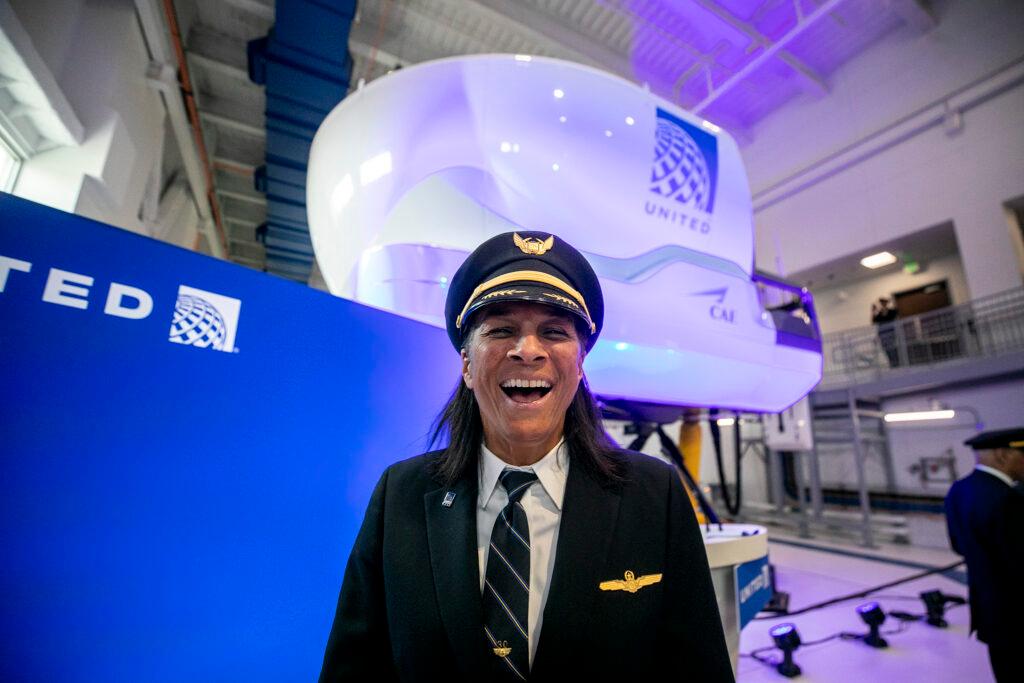
Warner: On several occasions. You've mentioned landings. Are those the most difficult part of flying?
Ward: It's the most difficult part to do extremely well. It's not that hard to land an aircraft unless you have some other conditions that make it tough, like hot days, crosswinds, low weather, nighttime, short runways, and wet runways. But to do it well, and actually, this is one of the things that I tell the pilots that come through United every time in the simulator I go, “You can land safely and clunk it on, or you could actually take pride in what kind of landing you do. So actually work hard at it. Don't just say, ‘Oh, that's good enough.’ Never be satisfied.” Nothing like landing the airplane and no one knows you touched down. That is a really great feeling. Yeah.
Warner: Do you think much about climate change?
Ward: I think that we are polluting the world at an alarming rate, and my company is doing a great job trying to change that, but it is a change that will not come easy or quickly, and I think it's the responsibility of all of us to try and find those alternative fuels that will conserve our planet for future generations. Absolutely. It's hard to know you're burning gas at an alarming rate in your everyday job.
Warner: When you spoke at the National Gay Pilots Association, you said quote, as I approach the final years of my career…
“I realized that no matter what you accomplish your entire life, it only lives on as long as you do. And so it really is about leaving a legacy. United is going to leave a legacy as being the best airline in the history of aviation, but more importantly, United is going to leave a legacy about the best place anyone could ever work for, especially members of the LGBTQ plus community.”
But Captain, there seems to be a real backlash as well against D.E.I. work. Do you worry that backlash will lead to backsliding, or backtracking?
Ward: Absolutely, I do. I am alarmed at the precedents of this country to remove precedents. We are re-adjudicating decisions made, important decisions made in the history of our country, and saying, we know better than what someone before us did. And I do see us moving in a alarmingly wrong direction. And my biggest fear, just from a personal level, is that someone will try to take away the right for gay people to marry. And same-sex marriage is incredibly important to me. I saw a sign recently and it said, my rights shouldn't infringe upon your rights; it's not like it's a piece of pie. There should be enough for everyone. And so yeah, I'm very concerned. I'm concerned about the direction that we could be going not just as a country, but even the world. There are some terrifying dictators that really want to rule the world, and it is really scary.
Warner: What still needs to change in commercial aviation to make it a more diverse, more welcoming, frankly, industry?
Ward: It's absolutely down to exposure. Women and women of color, they just need to have that opportunity and the opportunities are scarce because of either exposure or because of financial obligations. And so that's one of the things I'm incredibly proud of with United Airlines creating the Aviate Academy because they're giving pathways for people to be in this career field that before would have immediately dismissed it because they didn't have the money or the opportunity to do so.
Warner: Who's a role model? Who's a hero for you? And you can name your mom. Wasn't your mom the first Black woman to graduate from the University of Chicago Medical School?
Ward: She was definitely one of two. And she's absolutely my role model. And it's not because she was the first, or one of the first, Black women to graduate from the University of Chicago, but because she did it in her thirties. And I mean, to go back to medical school when you have three kids and you're still feeding them and washing clothes and being a traditional mom, and then to excel at that, it basically told me you can do anything you want in life. And if you wake up one day and you're not doing what you want to do, change it. When you have someone that's that overachieving in your life, everything seems possible. And it was, I honestly credit everything to my mom and just what an amazing role model she was for me.

